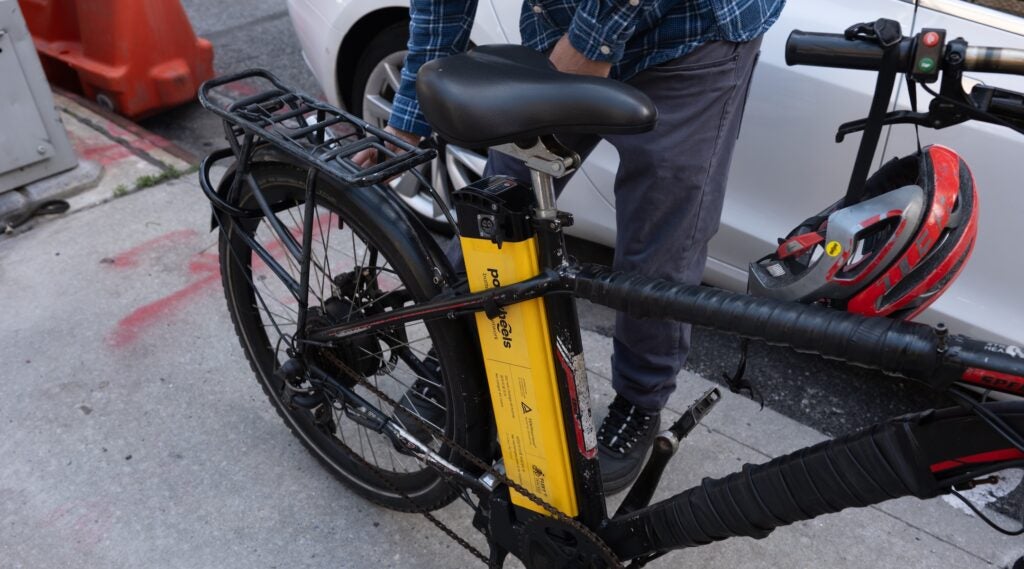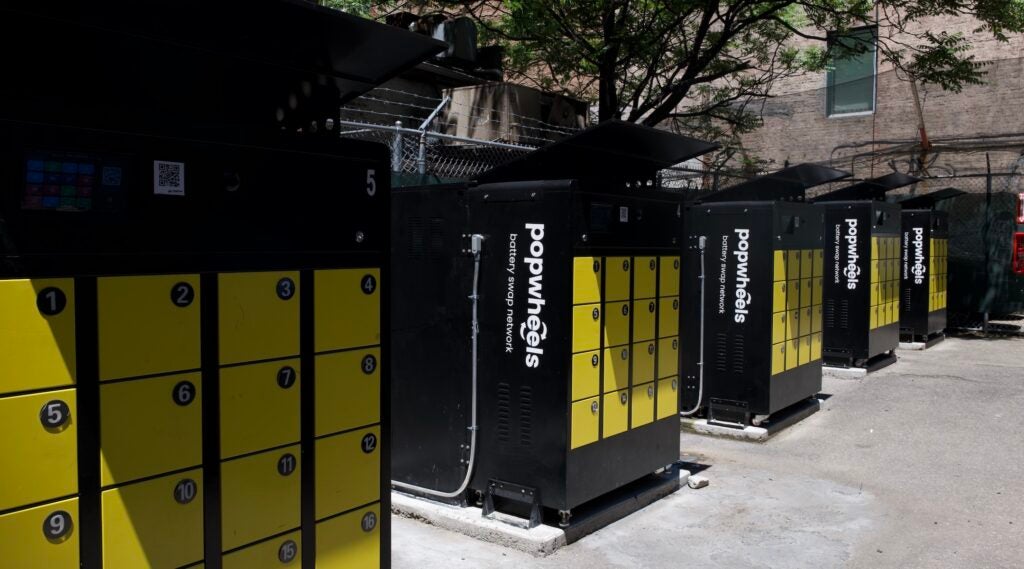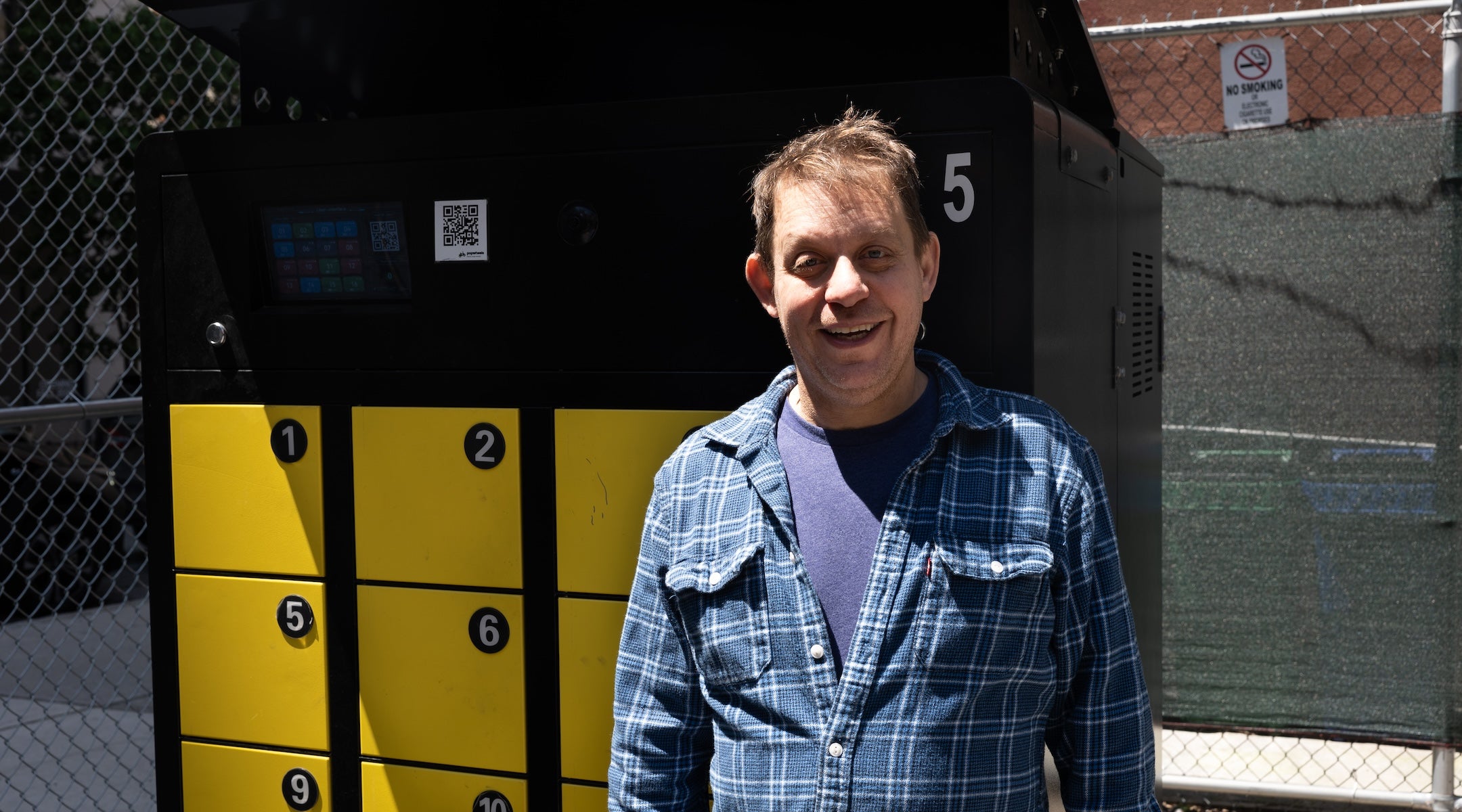Electric bikes have become a common sight on New York City’s streets, especially among the city’s estimated 65,000 food app delivery workers — a significant portion of whom are immigrants.
And while e-bikes can be a fun and efficient way to get around, New York has also been “flooded with uncertified batteries and e-bikes and e-scooters of questionable quality,” according to City & State. Lithium-ion batteries are now a leading cause of fires — and fire deaths — in New York City.
PopWheels, a lithium-ion e-bike battery swap network co-founded by two Jewish New Yorkers, is taking on the tall task of reversing that trend.
Following a successful pilot program with the city’s Department of Transportation last year, PopWheels opened its first permanent e-bike battery-swapping station earlier this month.
“It’s something to save lives,” co-founder Baruch Herzfeld, 53, who was named to the New York Jewish Week’s 36 to Watch last year, told the New York Jewish Week.
The PopWheels “battery swap” model aims to remove the need to charge e-bike batteries at home, which puts them at risk of fire. E-bike riders — who use bright-yellow, safety-tested batteries provided by PopWheels — pay a $75 monthly fee that gives them access to PopWheels’ stations, where the batteries charge. Whenever their battery is running low, they can swap it for one that’s locked up in a PopWheels cabinet; an interface shows each battery’s percentage, allowing them to choose and withdraw a fully-charged one.
“The whole city is charging batteries in their house,” Herzfeld said while giving a tour of PopWheels’ first — and so far, only — station at Dominick and Hudson Streets in lower Manhattan’s Hudson Square. “You know, there’s tenements full of immigrants just charging batteries.”
At issue is the danger that batteries left charging for an extended period of time — for example, overnight — can lead to them overheating. Cheaper batteries — or ones that are damaged — are at an especially high risk of catching fire, which poses dangers for delivery cyclists who’ve purchased inexpensive equipment. And because they contain so much energy, lithium-ion battery fires are often too powerful to be smothered by a home fire extinguisher.
PopWheels’ pilot program with the DOT, which ran from February 2024 until February 2025, demonstrated some tangible progress. Though lithium-ion battery fires increased from 2023 to 2024, those fires killed six people in 2024 versus 18 the previous year. A key reason, according to the FDNY, was that fewer battery fires were occurring indoors.
Delivery cyclists participating in the pilot program had swapped their batteries over 14,500 times as of October 2024, the New York Times reported, with many workers swapping once or twice per day. No fires were reported at any of the charging stations, or with any of the batteries.
“Delivery cyclists in this pilot have voted with their feet,” Ydanis Rodriguez, the city’s transportation commissioner, told the New York Times that month. “Thousands of battery swaps later, we know they prefer a charging option that is convenient and much safer than charging at home.”

A PopWheels battery in action, powering Herzfeld’s e-bike. (Joseph Strauss)
Over the coming months, Herzfeld said he plans on opening at least eight more PopWheels locations — including in East Harlem, Williamsburg and near the former site of Ebbets Field in Brooklyn’s Flatbush neighborhood.
But in order to get each location fully operating, Herzfeld said he needs to make sure they’re “kosher” — meaning, in this case, that they meet the safety and code standards set out by the fire department.
It’s a somewhat byzantine process that Herzfeld, who grew up in an Orthodox community on Staten Island, describes as “Talmudic.”
“The Talmud is always about these weird rules,” Herzfeld said, pointing to an old rabbinical debate over how many goats one should slaughter in a specific sacrifice.
He elaborated on some of the “Talmudic” rules he’s faced at work: “You can’t be 10 feet from anything flammable, and you can’t be five feet from an obstruction — but what’s an obstruction? Is this type of fencing obstruction?” he asked, pointing to the chain link fence that surrounds the small downtown lot that’s home to the PopWheels hub.
And don’t get him started on the differences between dealing with public property (known as “reshut harabim,” in rabbinic writings) and private property (“reshut hayachid”) — a meaningful distinction in municipal as well as Jewish law. The existing Hudson Square location, for example, is built on a private property being leased to PopWheels, but a whole different set of rules applies to prospective sidewalk locations.
While PopWheels needs FDNY approval at each location, they also need a “kosher” certification — as Herzfeld calls it — from Underwriters Laboratory, an organization that sets safety standards for a wide array of products.
For example, Herzfeld said that he and his co-founder, David Hammer, had to order a particular type of fire-resistant tarp to line the fenced perimeter of the PopWheels station, which could only be purchased from one supplier in northern Michigan. “But when we got it, [the inspectors] were like, ‘Where’s the tag?’ Because you need the ‘kosher’ tag — it’s like the OU,” he said, referring to the Orthodox Union, which operates the country’s most well-known kosher-certifying agency.

PopWheels’ Hudson Square location is now up and running, as others await approval. (Joseph Strauss)
Herzfeld, who graduated from Yeshiva University High School, also known as MTA, said he’d become fed up with learning Talmud by time he entered college. “I couldn’t understand the impracticality of it,” Herzfeld said.
Now, however, to help get a better sense of all the bureaucracy, he studies the Talmud for 45 minutes every day before work: “That’s how I get ready to deal with the Fire Department of New York City.”
He added, “They’re nice people, they work with us, but the whole thing is very Babylonian.”
Before founding PopWheels, Herzfeld — who lives in Crown Heights with his wife, four kids and an au pair who speaks to his triplets in Mandarin — started and ran a business that provided immigrant taxi drivers with the ability to connect to radio stations in their home countries.
“I like immigrants,” he said. “I always talk to them in their language.” (Herzfeld can speak conversational Spanish, Hebrew and Yiddish. He’s also learning Arabic, he said, and can say “Hello,” “Goodbye” and “Thank you” in over 40 languages.)
Long passionate about bicycles and transportation, Herzfeld says he “wants to get cars off the street.” His 12-year-old son recently advocated for a bike lane at a town hall with Mayor Eric Adams, to the chagrin of some Orthodox Jewish attendees, who claim bike lanes can cause dangerous conditions for children getting off school buses. Herzfeld is also the former operator of the Traif Bike Gesheft (Yiddish for “non-kosher bike business”), which distributed used bicycles to Satmar Hasids in Brooklyn.
Herzfeld said the idea for PopWheels came to him around the start of COVID-19 in 2020, when he was riding an electric cargo bike that fit him and his triplets. Eventually, the bike’s battery stopped working. When a repair shop replaced it, he realized that batteries normally used for delivery-style bikes, as well as for recreational-style bikes, are mostly interchangeable.
At the same time, reports were surfacing of fires tied to lithium-ion batteries — including one that broke out in his neighborhood. “I got nervous because I have my triplets, and I don’t want to bring the battery into my house,” he said.
Now, a growing number of delivery workers are able to alleviate that same fear. PopWheels has more than 160 paying members, Herzfeld said, with another 250 to 300 on the waiting list, who will be served as more locations — with more batteries — become available.
“At the end of the day, we have the underlying ethical mandate to take batteries out of homes,” Herzfeld said.
If Herzfeld has his way, there will be PopWheels cabinets across the city one day. For now, however, it’s taking time to get the required approvals at every location. Fortunately, Herzfeld knows how to prepare.
“The Talmud shows you the path,” Herzfeld said. “The Talmud — the ancient Jewish book that nobody ever really understands — shows you the path.”
The New York Jewish Week brings you the stories behind the headlines, keeping you connected to Jewish life in New York. Help sustain the reporting you trust by donating today.





